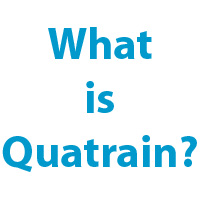What is Quatrain?
Quatrain refers to a stanza in a poem containing four lines. The term quatrain is also used to refer to a four-line poem.

There is no necessity of any rhyme scheme of quatrain but the following rhyme schemes are common in poetry: abcb (which is known by the name balanced stanza), abba and abab. The quatrain is the most common stanza form in English language poetry.
Many of William Blake’s Songs of Innocence and of Experience are composed in quatrains. In “Infant Sorrow,” each quatrain exhibits an aabb rhyme scheme:
My mother groand! my father wept.
Into the dangerous world I lept,
Helpless, naked, piping loud;
Like a fiend hid in a cloud.
Struggling in my father’s hand,
Striving against my swaddling bands;
Bound and weary I thought best
To sulk upon my mother’s breast.
Tennyson’s elegy for Arthur Henry Hallam, entitled “In Memoriam” (1850), is written entirely in quatrains with an abba rhyme scheme:
Ring out the old, ring in the new,
Ring happy bells, across the snow:
The year is going, let him go;
Ring out the false, ring in the true.
Josephine Miles often wrote in unrhyming quatrains. The following one is from her poem “Belief” (1955):
Mother said to call her if the H-bomb exploded
And I said I would, and it about did
When Louis my brother robbed a service station
And lay cursing on the oily cement in handcuffs.
Published on 22 Sept. 2014 by Kedar Nath Sharma
